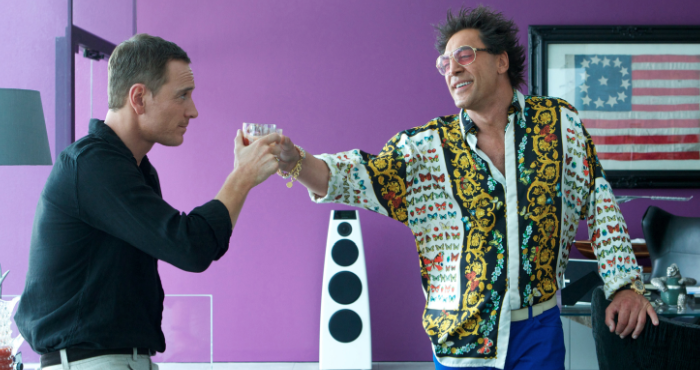I’d like to read the script for The Counselor. I want to get a clearer picture of what sort of intent drives this film. I want to understand whether Cormac McCarthy simply isn’t suited to screenwriting, or if he is actually sneakily parodying himself here. And most of all, I want to see with my own eyes how one of the greatest living writers describes a woman humping a car. That scene, in which Cameron Diaz’s character mounts a windshield before the eyes of a hilariously slack-jawed Javier Bardem, is what feels like the biggest tip-off that this movie may in fact be some kind of elaborate joke. Besides scattered moments of McCarthy’s trademark horrific violence, it’s also the only part that has any energy in it. Mostly, The Counselor is a tremendous bore.
Michael Fassbender plays the titular character, who is only ever referred to as “the Counselor.” In a none-too-subtle twist, his character never provides anyone with any legal advice at any point in the story, and he instead has a good deal of people counseling him on various subjects, from diamonds to investing in drug deals. He gets quite a bit of advice on the latter, actually, since he’s taken part in a heroin-smuggling scheme in order to secure his financial future. He has a lavish lifestyle and a lavisher fiancé (Penelope Cruz) to support, after all. The Counselor’s associates in the deal include nightclub owner Reiner (Bardem) and cowboy-wannabe businessman Westray (Brad Pitt). They stand to gain $20 million, but when the heroin shipment is hijacked, the Mexican cartel becomes suspicious of them, putting their lives at risk.
The Counselor pulls off the impressive feat of somehow making a straightforward plot almost entirely ineffable through bizarre obfuscation. While the sequence of events through which the drug deal spirals out of control is simple enough, the motivations of some of the characters are nigh impenetrable. Reiner’s girlfriend Malkina (Diaz) is pulling the strings and double-crossing the Counselor and his associates, but none of her machinations make sense. The whole reason the cartel believes the Counselor has something to do with the deal going bad is due to an incredibly unlikely coincidence that no one could possibly have anticipated.
McCarthy pulled a similar trick in No Country for Old Men–the intricacies of the drug business to which we are not privy were part of the point. After all, the protagonist was in way over his head. The same can be said for the Counselor, but here, the effect is alienating. It doesn’t help that the characters are cyphers in a stereotypical rather than archetypical way. Nothing is revealed of the Counselor’s personality or backstory, which makes it baffling that the film tries to invite our sympathies toward him as things fall apart. His bland-to-the-point-of-mad-libs-writing romance with his fiancé certainly isn’t enough. Fassbender, usually an assured actor, feels adrift here.
Really, every good actor in this cast is done a disservice by the script. Bardem, whose Flint Lockwood hairdo and John Boehner tan seem like the second-biggest hint that this is all a farce, does little more than react to his girlfriend’s zaniness. He’s not nearly as bad as Diaz herself, though, who can’t sell herself as a femme fatale mastermind at all. She’s dealing the kind of script that gives Malkina a cheetah spot tattoo, a pair of pet cheetahs, and a monologue about how much she loves watching them hunt. Pitt comes off the best, playing the one guy who has any real idea of what’s going on, and even he is mostly dull.
But again, most of the film itself is dull. The first half consists of scene-after-scene of redundant, desolate conversations. It’s endless speechifying that runs together into a near-solid slough of pointlessness. I nearly fell asleep. Then Diaz grinds a car and things noticeably pick up. People begin to die, and as one would expect from McCarthy, each death is awful and cruel and presented without varnish. The soliloquies don’t stop, but they begin to feel more like McCarthy’s philosophical voice rather than being purely functional. The Counselor doesn’t turn into a good movie, but it does turn into a much more interesting one. McCarthy is treading his familiar ground of exploring the endless cruelty of man, the meaninglessness of life and death, and how bad choices doom people. These themes are not delivered with grace, but they are certainly felt. It’s as bleak as anything he’s ever written.
I’ve continually referred to The Counselor as Cormac McCarthy’s film, rather than director Ridley Scott’s, and that’s because it feels a thousand times more like a work of the writer. McCarthy’s sensibility is all-encompassing, and it seems like Scott is just there to realize it. All the good and bad aspects seem to have come straight from the script. The Counselor is half navel-gazing and half despair, and both feel like McCarthy’s writing hallmarks wrenched tight to the point of self-parody. Even if that’s the case, it’s only involving in spasms, and the good parts go nowhere he hasn’t been before.





















3 thoughts on “‘The Counselor’ Needs More Car-Humping”
RE your headline: You pretty much can say that about ANY subject.
Indeed. But The Counselor already has some of it. Hence, it needs more.
Good review – really gets to the heart of why this film – which should have been really good – doesnt really work very well.